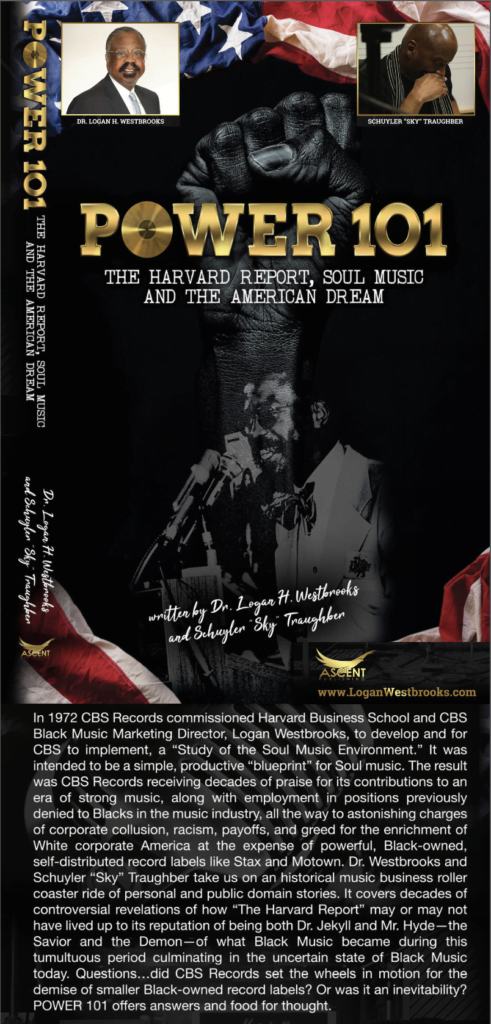By Camm Ashford
“Power 101: The Harvard Report, Soul Music & The American Dream” is a recently-released book co-authored by native Chattanoogan Schuyler “Sky” Traughber.
The book tackles the question…”Did CBS Records set the wheels in motion for the demise of smaller Black-owned record labels, or was it an inevitability?”
Using personal and public domain stories, Traughber and Dr. Logan Westbrooks detail how, in the 1970s, powerful music corporations gained promotion, marketing and distribution control of Black music from smaller, indie-distributed 1960s and 1970s record labels.
These soul, blues and gospel Black-owned labels–including Motown, Stax, New York’s Sue Records and Houston’s Duke Records–at one time represented hit artists such as Ike & Tina Turner, Bobby “Blue” Bland, Mighty Clouds of Joy and Willie “Big Mama” Thornton, among others.
In 1972, CBS Records commissioned Harvard Business School and Westbrooks, its Black Music Marketing director, to develop–and for CBS to implement–a “Study of the Soul Music Environment.”
The CBS Records “Harvard Report,” as it’s now known, was intended to be a simple and productive “blueprint” for soul music. Instead, its controversial revelations opened up a can of worms.
Traughber said the Harvard Report praised CBS Records for its contributions to an era of strong music, along with its employment of Blacks in positions previously denied to them in the music industry. But, he said, the report also exposed charges of “corporate collusion, racism, payoffs and greed for the enrichment of white corporate America at the expense of powerful Black-owned, self-distributed record labels” such as Stax and Motown.
“The Harvard Report will go down in the annals of music history as a Dr. Jekyll and Mr. Hyde,” Traughber explained. “It led CBS to hire more Black executives in positions previously denied to them, including yours truly. But at the same time, it may have been used to cancel Black-owned self-distributed record labels as an economy force in the music industry at a time that the overall pop music industry was exploding with changing contractual and finance models, rising radio costs–and most importantly, strong distribution and collection networks.”
After many years teaching business and media at Berklee College of Music in Boston,
Traughber now resides in the sea-side community of Gloucester, Massachusetts, writing screenplays and giving guest college presentations on the Harvard Report.
Schuyler Traughber–named after Harlem Renaissance concert pianist Philippa Duke Schuyler–credits Alton Park Junior High band director Warrick Carter, as well as several other Chattanooga mentors and teachers, for his success.
“At Orchard Knob, Louis Hayes required me to learn multiple instruments, opening a ‘big picture’ of music tones and techniques,” Traughber recalled. “Joe Burke drilled me on the strengths and weaknesses of my bass-playing, while teaching me rhythms he had taught future James Brown drummer Clyde Stubblefield in Chattanooga.”
Traughber started his professional music career at age 15, playing bass at the Elks Club on Chattanooga’s Ninth Street (The Big Nine), before eventually joining The Temprees on We/Produce Stax Records in Memphis.
He also worked in radio promotion and product management at CBS Records in Atlanta and Los Angeles with acts such as Earth, Wind & Fire; The O-Jays; Heatwave; Herbie Hancock and Patti LaBelle. At Motown in Los Angeles, he acted as an A&R (artists and repertoire)/talent director for acts such as Teena Marie and DeBarge, eventually reporting directly to Berry Gordy.
Over the years, Traughber said he witnessed “first-hand this sometimes laudatory, sometimes troubling transition of Black music culture and its socio-economic strength.”
Traughber’s co-author, Dr. Westbrooks, is one of the first African Americans to work as a major record label music executive, paving the way for the African American music executives of today. A Memphis native, he attended LeMoyne-Owen College, and graduated from Lincoln University in Missouri.
In 2014, Dr. Westbrooks was awarded an Honorary Doctorate in Humane Letters from LeMoyne-Owen College. His career spans more than 50 years, which enabled him to contribute to the success of artists such as The Jackson 5, Nancy Wilson, Elvis, Chuck Brown & the Soul Searchers, Nelly and many more.
“Power 101: The Harvard Report, Soul Music & The American Dream” is available at Amazon, Barnes & Noble, as well as other locations.


